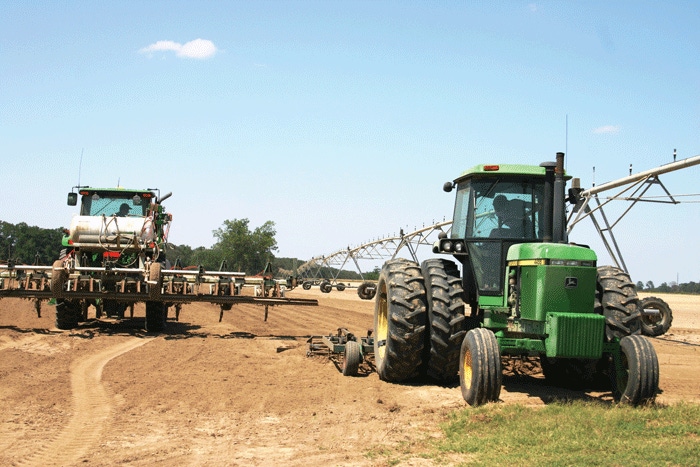November 30, 2012

Georgia’s new agricultural sales tax exemption (GATE) is expected to put an extra $72 million in the pockets of the state’s farmers over the next two years.
However, producers are reminded they’ll be required to have a tax exemption certificate before they can take advantage of the new law.
Effective Jan. 1, 2013, Georgia farmers will be exempt from paying sales tax on most materials used to produce commodities. This follows the Georgia General Assembly passing House Bill 386 earlier this year and Gov. Nathan Deal signing it into law.
To receive a sales tax exemption on agricultural equipment and production inputs, qualified farmers must submit their new tax exemption certificate to their retailer.
Applications may be completed electronically online at www.agr.georgia.gov or submitted by mail to Georgia Department of Agriculure, 19 Martin Luther King Jr. Drive SW, Suite 324, Atlanta, Ga. 30334. Applications also should be available at your local county Farm Bureau office.
The cost for the exemption certificate will be $20 if processed online or $25 for written applications. Payments can be made with Visa, Mastercard or personal check.
To qualify for a GATE certificate, a famer must: produce $2,500 per year or more in agricultural products; provide $2,500 per year worth of agricultural services or produce a long-term agricultural product with the potential to produce $2,500 per year; or be the owner of property that qualifies for the Conservation Use Value Assessment or Forestland Protection Act.
The GATE certificate may only be used by certified qualified agricultural producers, and certificates must be renewed annually. Failure to renew the annual certificate deactivates the certificate with no exemption availability.
GATE replaces the Agricultural Certificate of Exemption (ST-A1) form previously used in Georgia.
Feed, seed, fertilizer, chemicals, equipment and some types of energy have been sales tax exempt for year, but other inputs were not, explains Jon Huffmaster, director of the Georgia Farm Bureau Legislative Department.
The exemption now will include input costs for energy, equipment parts, trailers, crop-dusters, and more, in addition to the existing exemptions for feed, seed, fertilizer, chemicals, and equipment.
Variations explained
“The variations were due to exemptions being granted on a piecemeal basis through the years, resulting in hodgepodge legislation that was sometimes illogical,” says Huffmaster.
For example, under the previous laws, a tractor purchased for farm use was exempt from sales tax, but the same tractor would be taxable if used in an orchard. Electricity used in poultry houses was sales tax exempt, but electricity used in swine and dairy barns was not.
“The new law, House Bill 386, corrects much of this inequity by declaring that inputs used to produce a product for resale should not be taxed,” says Huffmaster.
The new agricultural sales tax exemption actually began taking shape in 2009, at a time when the U.S. economy was in a nosedive, and Georgia tax revenues were falling dramatically, he says.
“Georgia’s income dropped more than 20 percent in two years, and no one could reasonably predict the end to the downturn. Because Georgia is constitutionally mandated to have a balanced budget, the state cut spending and frantically looked for ways to increase income,” says Huffmaster.
One idea to increase income was to suspend or revoke all sales tax exemptions, he says, but that would have devastated Georgia farmers.
“For example, a 350-cow family-operated dairy might incur $1 million in annual feed costs. If the sales tax exemption were suspended, the dairyman would pay $70,000 in sales taxes on feed alone. Few farmers could absorb such an annual cash expense,” he says.
In 2010, the Georgia General Assembly created a special tax council to study the state’s revenue system and make recommendations to the legislature for improvements. Throughout 2010, the council held a series of public meetings, inviting citizens to make comments about Georgia’s tax policies. At each meeting, says Huffmaster, Georgia Farm Bureau members submitted official testimony detailing how their farms would be affected if sales tax exemptions were suspended or appealed.
In the council’s 2011 report, it recommended that all agricultural sales tax exemptions be retained. Furthermore, it urged that additional exemptions be instituted to cover all input costs. The purpose was not to give farmers a tax break, says Huffmaster, but to keep Georgia agriculture as competitive as possible by eliminating taxes on inputs destined to become products for resale.
A special committee of the General Assembly drew up legislation to incorporate the council’s recommendations, but lawmakers chose not to push forward with the bill in 2011. Early in 2012, the bipartisan bill was passed with little dissension.
“As with any legislation of this size and complexity, there are bound to be hiccups and delays along the way,” says Huffmaster.
“Georgia Farm Bureau will continue to monitor the regulations that are written to implement the sales tax exemptions and work to make sure they work for Georgia’s farmers. Any way you look at it, this tax reform legislation is good for Georgia farmers.
More information on GATE can be found http://www.agr.georgia.gov, and questions can be answered by phone at (855) FARM TAX, or (855) 327-6829.
About the Author(s)
You May Also Like




